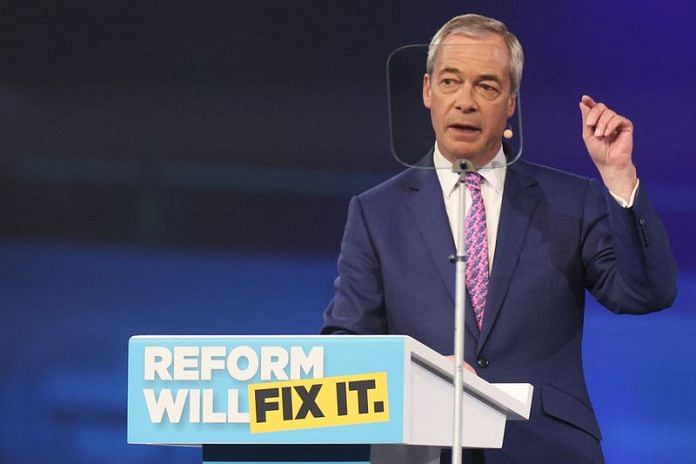LONDON (Reuters) -Britain’s populist Reform UK party presented plans on Monday to allow wealthy migrants to buy a 10-year residency permit for 250,000 pounds ($338,000) which would exempt them from UK tax on their overseas income, assets and capital gains.
The policy draws a new battle line before the next national election with Britain’s governing Labour Party. The government has closed exemptions on so-called “non-doms”, or non-domiciled residents, who have long paid little or no British tax on money earned overseas.
Reform leader Nigel Farage said the direct proceeds of the programme would be distributed to Britain’s lowest-earning 10% of full-time workers, and that the public finances would benefit taxation of money brought to or earned in Britain by the new migrants.
“We want, as a party, as many entrepreneurs, as many risk takers, as many job creators, as many people paying lots of tax, as many people investing huge sums of money – we want as many of them as possible to be in our country and that is why today we are coming up with this idea of the Britannia Card,” he said.
Farage said that around 10,800 wealthy people, some non-doms and some British, left Britain last year, using a figure that has been challenged as inaccurate by the Tax Justice Network, a campaign group that looks at tax evasion and avoidance.
“We are also doing something with a very specific aim, aimed at those in work,” Farage said. “So making that gap between being on benefits and going to work bigger, this policy will directly contribute towards that.”
Britain has not published official data on the number of millionaires who have left the country. The government’s Office for Budget Responsibility forecast in January that 1,000 non-doms would leave Britain in 2025-26 due to the tax changes but said this estimate was highly uncertain.
Reform UK is running ahead of Labour and the Conservatives in the polls before the next election, which must be held by the middle of 2029, buoyed by growing dissatisfaction with mainstream politics and a shift towards its brand of populism.
Responding to the policy, British finance minister Rachel Reeves told reporters that Reform had announced a “tax cut for foreign billionaires”.
Britain’s Institute for Fiscal Studies said it was “far from clear” if Reform UK’s proposals would be positive or negative for the public finances overall.
“Much depends on how many of those paying the 250,000 pound fee would have been in the UK anyway,” IFS economist Stuart Adam said.
The programme was more likely to attract people who wanted to keep most of their wealth outside Britain where it would not be taxed, rather than those who planned to invest major sums in Britain, he added.
($1 = 0.7408 pounds)
(Reporting by Elizabeth Piper; additional reporting by David Milliken; editing by Aidan Lewis, Mark Heinrich and Toby Chopra)
Disclaimer: This report is auto generated from the Reuters news service. ThePrint holds no responsibility for its content.




